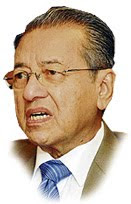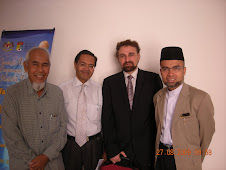Gulf Cooperation Council eyes common currency
CAIRO, Dec 29 — In a gathering marred by Israeli attacks on Gaza and pressured by the ailing world economy, leaders of the six Gulf Arab nations are gearing up for a summit in which they are expected to tackle head-on a long-elusive monetary union agreement.
The two-day meeting, beginning today in the Omani capital, Muscat, has been touted as a key step in helping the Gulf Cooperation Council’s six member states realise a goal of a common currency and broader economic unity. The push is made all the more relevant by the global economic crisis that has hit hard even these oil rich nations.
Officials yesterday said Israeli air strikes on the Hamas-ruled Gaza Strip, which have left over 280 Palestinians dead and sparked outrage throughout the Arab world, would not derail the meeting. But the violence would clearly factor into the summit agenda, as well as in the GCC foreign ministers meeting which precedes the main gathering.
Omani Information Minister Hamed al-Rashid said the Palestinian issue is always on the minds of the GCC leaders and “without doubt, the events in Gaza will be at the forefront of the upcoming meetings”.
While the leaders are expected to discuss the current financial meltdown, analysts and economists are watching to see what steps the officials will take to push along a plan for a GCC common currency, which is scheduled to be launched in 2010. Also important are their efforts to finalise details for the precursor to the bloc’s new central bank.
“This meeting is quite important because they will have to outline what they’re going to be doing prior to 2010, and they will also have to come out quite concretely about what is to come of that deadline,” said John Sfakianakis, chief economist at the Saudi British Bank.
The GCC, which includes Saudi Arabia, the United Arab Emirates, Oman, Qatar, Kuwait and Bahrain, has been discussing setting up a common currency for years but the issue has been stymied by political bickering and infighting.
While progress has been slow in bringing the nations together, the global financial meltdown has injected renewed vigour into efforts to push the oil-rich members toward closer economic cooperation.
GCC Secretary-General Abdul Rahman Hamad al-Attiyah told the pan-Arab daily newspaper Al-Hayat that leaders were well aware of the need to reach a joint agreement on how to tackle the financial crisis.
In an interview with the English-language Oman Tribune, Bahrain’s prime minister, Sheik Khalifa bin Salman Al Khalifa said the “integration of Gulf countries has become unavoidable”.
“At a time when the whole world is moving towards the establishment of economic blocs, it is high time that we accelerated the remaining steps for the economic integration of GCC states,” he was quoted as saying.
So far, each country has been taking its own steps to tackle the crisis, adopting measures ranging from cutting interest rates, injecting cash into the economy, guaranteeing deposits and lowering cash reserve requirements for banks.
“At times of economic crisis, you expect that there is great unity, or the attempt to be one voice instead of many voices,” said Sfakianakis. “The onus is on the GCC to show how they’re handling this and that they are one instead of six voices.”
Tumbling oil prices are also a major stimulus for embracing greater cooperation.
Crude prices have plummeted by more than 60 per cent since mid-July highs of nearly US$150 (RM525) per barrel, straining budgets and spending in these nations, some of which rely on oil sales for up to 90 per cent of their foreign revenues.
Analysts and economists have said the Gulf Arab region’s vast oil wealth, and the budget surpluses realised from this past year’s surge in crude prices, will help cushion the countries from the worst of the economic downturn that has hammered the rest of the world.
The Institute of International Finance, in a recent study, estimated that GCC countries’ economic growth would slow from 5.8 per cent in 2008 to 4.2 per cent in 2009. The figure is markedly higher than the 0.9 per cent global economic growth rate forecast by the World Bank earlier this month.
Even so, the impact has been pronounced. Stock exchanges in the region have plummeted — in Dubai by as much as over 70 per cent since the start of the year.
Saudi Arabia, the Arab world’s economic powerhouse, recently unveiled a budget reflecting projections of its first deficit since 2002. In the last fiscal year, the country realised a surplus of US$157 billion, largely on oil revenues.
The kingdom, however, has ramped up spending, allocating more funds to infrastructure development, education and health care as it looks to diversify its economy.
The summit is also being watched closely as a measure of whether the leaders in these Arab countries will act decisively or, as has happened too often in past Arab summits and gatherings, emerge with little more than an agreement to agree at a later date.
“Everybody is talking about the deadlines not being met,” said Sfakianakis. “If they move with the 2010 deadline, they will have to announce what concrete steps they will be taking.” — AP
Subscribe to:
Post Comments (Atom)







































No comments:
Post a Comment